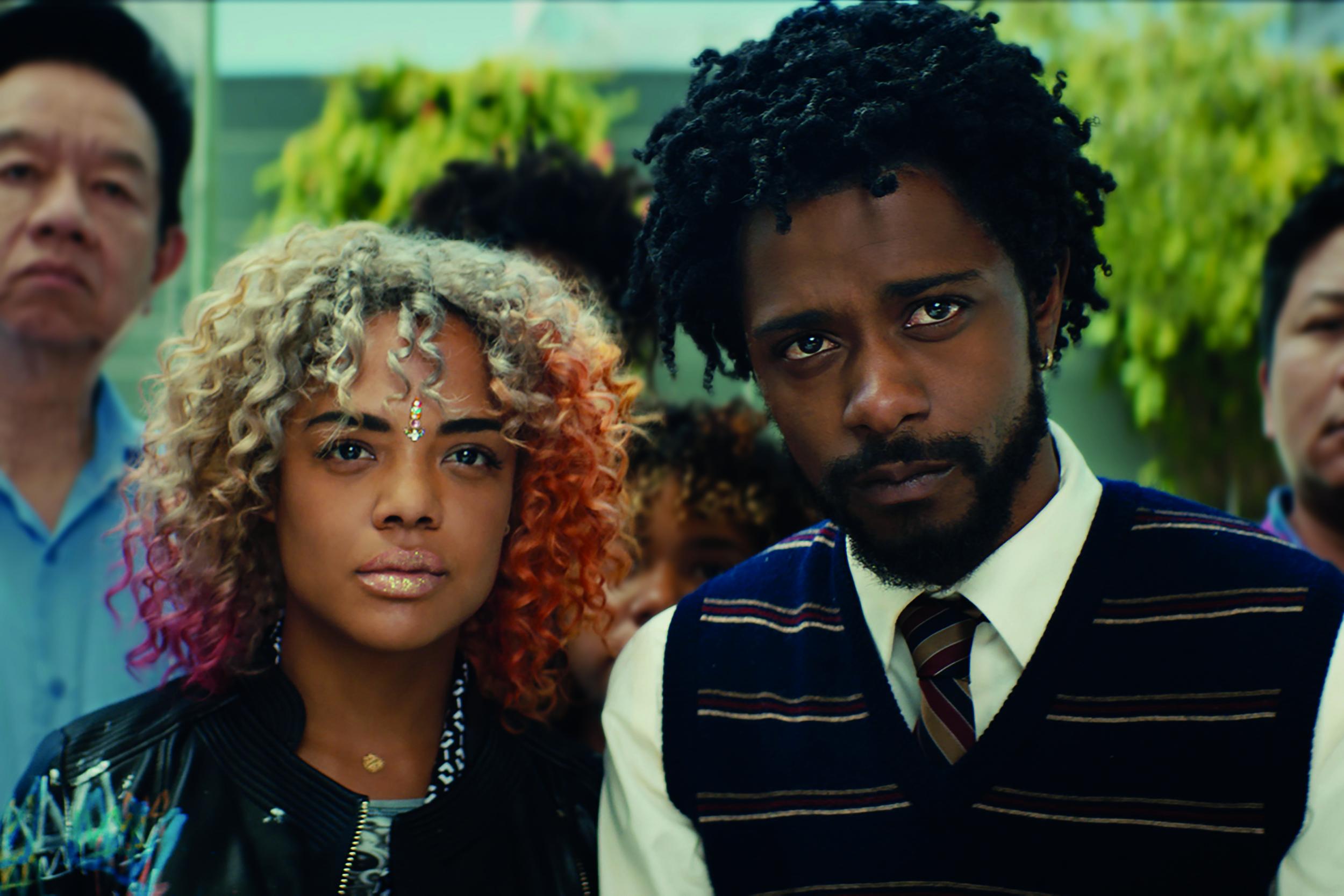Boots Riley on Sorry to Bother You: 'Trump, Obama or Bush – their function is to serve the ruling class'
The veteran rapper explains to Clarisse Loughrey why he doesn’t want you to see his exhilarating directorial debut as a Trump satire


Your support helps us to tell the story
From reproductive rights to climate change to Big Tech, The Independent is on the ground when the story is developing. Whether it's investigating the financials of Elon Musk's pro-Trump PAC or producing our latest documentary, 'The A Word', which shines a light on the American women fighting for reproductive rights, we know how important it is to parse out the facts from the messaging.
At such a critical moment in US history, we need reporters on the ground. Your donation allows us to keep sending journalists to speak to both sides of the story.
The Independent is trusted by Americans across the entire political spectrum. And unlike many other quality news outlets, we choose not to lock Americans out of our reporting and analysis with paywalls. We believe quality journalism should be available to everyone, paid for by those who can afford it.
Your support makes all the difference.Boots Riley has just made one of the most exhilarating directorial debuts of the year. Sorry to Bother You is an anti-capitalist parable with flair and bite.
Get Out’s Lakeith Stanfield plays Cassius Green, a black telemarketer who learns to channel his “white voice” to scale the corporate ladder only to discover acceptance in the higher tier means becoming privy to its darkest secrets. It’s absurdist, hilarious, nightmarish, whimsical, sinister, and cool. But getting it made wasn’t easy. “Had someone told me it was going to take that long, I probably wouldn’t have done it,” says Riley, with a smirk.
Perhaps it’s ironically fitting that Sorry to Bother You’s lengthy, seven-year production history was encumbered by all the usual trials of the industry, where money is king. It also explains why the veteran rapper sits back to reflect on his achievements with a note of weariness. He wrote the screenplay back in 2012, using the title for an album released by his hip-hop collective The Coup, but found he had no real concept of what to do next.
A chance encounter with writer Dave Eggers in 2014, however, compelled him to push forward anyway; he attended the Sundance Film Festival’s prestigious screenwriters and directors labs (where many now-beloved independent films were developed), and quickly gained the interest of fellow creatives. He found mentors in the likes of Guillermo del Toro, Jordan Peele, and David Gordon Green.
Ultimately though, Riley says: “You still end up needing the people with the money.” And that can so often spell bad news for the artistic process.
The director describes “a couple of producers who I won’t name” whose notes on the film he felt were driven by what he calls “the regular fear” that comes with ensuring a film turns a profit. He adds: “Independent producers... that’s the situation that they’re in. They’re going to investors, they’re trying to make people look good, trying to make the thing more of a sure bet. But, my thing with them was, look, I’ve got all of these masters to go to that have made these films and they’re not saying this about this. So why should I take your note over theirs? Or over my own in that case?”
Then there are producers like Nina Yang Bongiovi. Alongside her business partner, actor Forest Whitaker, she helped bring to screen Fruitvale Station and Dope – two releases which met with critical acclaim and strong box office numbers. “I found out later that she had told her investors, ‘you don’t need to read this script, just trust me’,” Riley says. “‘I’ve made you a bunch of money already. So, trust me on this one’.”
She was right: Sorry to Bother You earned an impressive $17m – on a $3.2m budget – at the US box office this summer.
I’m speaking to Riley at the very end of this bumpy road: we’re sat in a plush hotel room, the day after Sorry to Bother You had its UK premiere at the London Film Festival. As he describes his joys and frustrations with the film and its production, I slowly begin to feel I’m being studied. There’s something inquisitive about his gaze. It’s as if he’s attempting to scan my soul and figure out what kind of person I am before our allotted time is up, although I don’t get the sense he’d be judgmental, whatever the result.

Watch Apple TV+ free for 7 days
New subscribers only. £8.99/mo. after free trial. Plan auto-renews until cancelled

Watch Apple TV+ free for 7 days
New subscribers only. £8.99/mo. after free trial. Plan auto-renews until cancelled
As his work hints, Riley appears to have a keen interest in the individual, in a way that acknowledges how they’re shaped by the world. That’s why we can have so much sympathy for protagonist Green, even as he becomes complicit in the system that seeks to destroy him – because we see how much of it is driven simply by the need to survive. What he wants us to understand is that this cycle is neither natural nor inevitable.
Sorry to Bother You exists to illuminate reality, even if it descends into complete absurdism. It depicts exactly what collectivised action can achieve, as Cassius’s telemarketer colleagues form a union to lobby their company, Worry Free, for decent wages. Riley sees the film’s function as very similar to collectivised action itself, since strikes and protests help educate the public.
“If you’re involved in a strike at a workplace,” Riley says. “Part of it is to win that thing, but the struggle itself teaches people how the world works.”
Riley fits snugly within the definition of artist-activist. It’s a draw he’s felt since childhood. He was born in 1971 in Chicago, to parents who had met during a student-led strike at San Francisco State University. His father volunteered as a housing and welfare rights advocate and a car industry organiser before working as a civil rights and criminal-defence lawyer.

His parents moved to Oakland, California, when Riley was six and by the time he was 15 he had joined the radical Progressive Labour Party. In 1991, he co-founded The Coup, acting as primary lyricist. Their work was deliberately confrontational, with album titles such as Kill My Landlord (1993) and Pick a Bigger Weapon (2006), although he recently dismissed the former as “a pamphlet on tape”, adding he’s now more interested in speaking to audiences who don’t directly identify with his politics.
Which is exactly what Sorry to Bother You sets out to achieve, aided by a cast of recognisable faces as Tessa Thompson and Armie Hammer also star. The film takes the familiar tropes of dystopian fiction – corporate giants as sinister authoritarian forces, for example – and places them distinctly in today’s timeline. Riley’s point is that dystopia is now, and always has been.
To his dismay, radical writers have long hidden behind the fantasy of science fiction in an effort to soften the blow of their ideas on an unsuspecting public. “It’s like Star Trek,” the director says. “They’re in a socialist society in Star Trek but, you know, you could be a right-wing Republican and love Star Trek, because it’s so different.”
It’s easier to miss the Federation’s utopian vow to share knowledge and resources when there are so many weird-looking aliens walking around. Star Wars, too, was actually the offspring of George Lucas’s attempts to make Apocalypse Now, before the latter was passed on to Francis Ford Coppola. A 1973 draft of the first film spelled out the analogy: the Viet Cong are the Rebel Alliance and the United States are the Empire.
“But it’s in such a different world that the politics of it couldn’t matter the least of anything we’ve ever seen,” Riley says of Star Wars and its ilk. “It’s easier to talk about it in this way, maybe because writers aren’t involved in movements. It’s all abstract, it’s all theory. And for me, I have a feeling of what I want people to be able to apply it to, you know?”
Since Riley wrote the film’s screenplay he has inevitably had to update it, although not in the ways one might expect. “I had to alter it so that it didn’t reflect now as much,” he says. “Because I didn’t want it to seem like I was only talking about right now and this moment.” Eerily, the director had to remove a line uttered by Omari Harwood’s mysteriously named character, Mr _______, a senior executive at the company. It was the catchphrase: “Worry Free is making America great again.”
It was crucial Sorry to Bother You did not appear as a satire of the Trump era, but rather as a demonstration of “how this system works”. Riley adds: “Trump or Obama or Bush, they’re in a seat that has a function, and that function is to serve the ruling class. A lot of things that we protested about George W Bush, Obama kept doing. And some of the things that are being protested about Trump, Obama was doing. If we only focus it on Trump, then they can run somebody that’s two inches to the left of Trump and people are, like, well at least it’s not two inches to the right. And we forget everything.”
Sorry to Bother You is Riley’s chance to express what he sees as the bigger picture. “I think art is communication,” he says. “Every human being should be trying to make the world better. Whatever you think human beings should do is what art should do. Art is just an extension of humanity.”
Sorry to Bother You is released in UK cinemas 7 December
Join our commenting forum
Join thought-provoking conversations, follow other Independent readers and see their replies
Comments